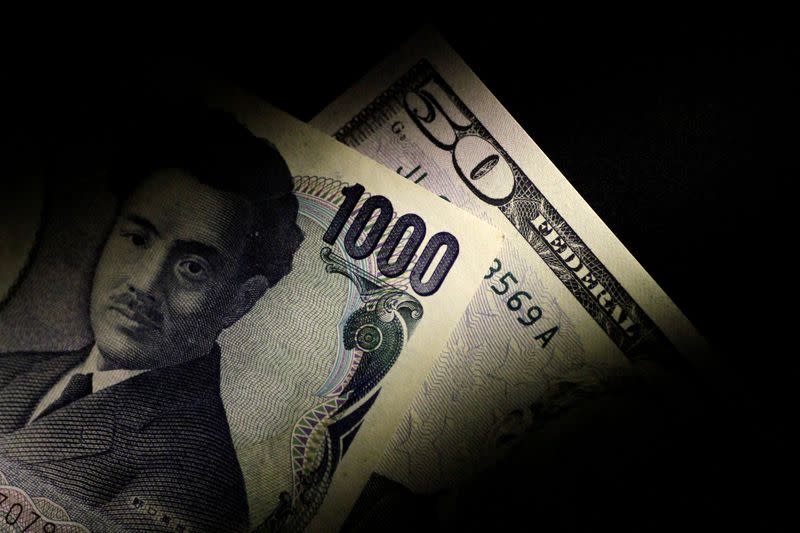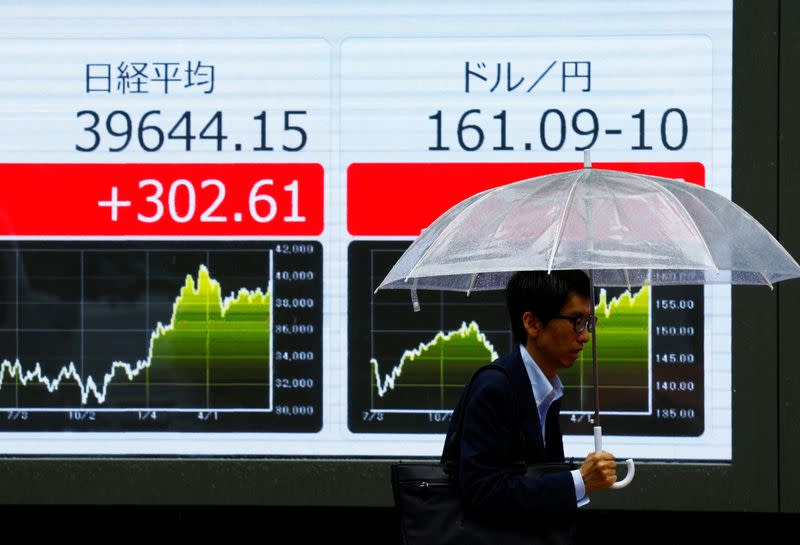Japan names new FX diplomat as yen hits 38-year low
By Makiko Yamazaki and Satoshi Sugiyama
TOKYO (Reuters) -Japan appointed a new top foreign exchange diplomat on Friday as the yen plumbed a 38-year low against the dollar, heightening expectations of imminent market intervention by Tokyo to shore up the battered currency.
Atsushi Mimura, a financial regulation veteran, replaces Masato Kanda, who launched the biggest yen-buying intervention on record this year and aggressively jawboned speculators against pushing down the Japanese currency too much.
While the change is part of a regular personnel reshuffle conducted every year, it comes as markets test Japan's resolve to arrest a renewed fall in the yen that adds pain to households and companies by pushing up import costs.
"Kanda appeared to be someone aggressive, given his comments that authorities were on stand-by to intervene any time of the day," said Hideo Kumano, chief economist at Dai-ichi Life Research Institute, adding that his departure could affect how Japan communicates its currency policy.
"But it's hard to say until we see how his successor steers policy. All in all, I don't think the big policy direction would change much."
Japanese officials reiterated their warnings as the yen slid past 161 per dollar on Friday, well below levels that triggered the last bout of intervention in end-April and early May.
"Excessive volatility in the currency market is undesirable," Finance minister Shunichi Suzuki told a news conference on Friday, adding that authorities will "respond appropriately" to such moves.
He also said authorities were "deeply concerned" about the impact of the yen's "rapid and one-sided" moves on the economy.
Japanese authorities are facing renewed pressure to stem sharp declines in the yen as traders focus on the interest rate divergence between Japan and the United States.
A weaker yen is a boon for Japanese exporters, but a headache for policymakers as it increases import costs, adds to inflationary pressures and squeezes households.
Under Kanda, who was FX diplomat for three years, Tokyo spent 9.8 trillion yen ($60.85 billion intervening in the foreign exchange market at the end of April and early May, after the Japanese currency hit a then 34-year low of 160.245 per dollar on April 29.
The yen hit 161.27 per dollar on Friday, its weakest since 1986, ahead of a crucial U.S. inflation data due later in the day that could heighten market volatility.
Market players see authorities' next line-in-the-sand as lying somewhere around 164.50.
"If authorities want to prevent the yen from breaching that threshold, they will probably step in before the currency hits that level," said Daisaku Ueno, chief FX strategist at Mitsubishi UFJ Morgan Stanley Securities.
NEW DIPLOMAT
Mimura's appointment will take effect on July 31 after the meeting of the Group of 20 finance ministers and central bank governors in Rio de Janeiro from July 25.
Little, however, is known about his stance on currency policy. Currently head of the ministry's international bureau, the 57-year-old will become vice finance minister for international affairs - a post that oversees Japan's currency policy and coordinates economic policy with other countries.
Having spent nearly a third of his 35-year government career at Japan's banking regulator, Mimura has expertise and international ties in the area of financial regulation.
During his three-year stint at the Bank for International Settlements in Basel, Mimura helped set up the Financial Stability Board in the midst of the 2008-2009 global financial crisis to reform financial regulation and supervision.
At the finance ministry, he worked on the revision to the law over the Japan Bank for International Cooperation last year to expand the scope of the state-owned bank and make foreign companies key to Japan's supply chains eligible for loans from the bank.
Mimura was also part of a government team that briefed foreign investors on the 2020 revisions to foreign ownership rules to dispel the notion that tighter rules were meant to discourage foreign investment in Japan.
($1 = 161.0600 yen)
(Reporting by Makiko Yamazaki and Satoshi Sugiyama; Additional reporting by Takaya Yamaguchi; Writing by Leika Kihara; Editing by Muralikumar Anantharaman and Sam Holmes)

 Yahoo Finance
Yahoo Finance 

